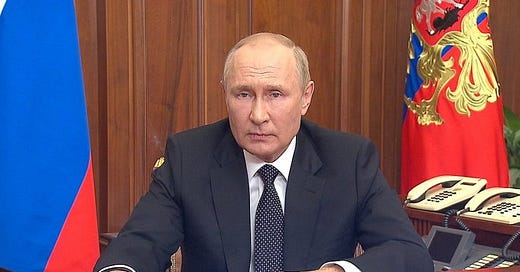On September 21, 2022, Vladimir Putin, President of Russia, spoke on the situation in Donbass and reported on “the special military operation to liberate [Donbass] from the neo-Nazi regime.” The goal of the operation, he declared, is “to protect the sovereignty, security and territorial integrity of Russia and support the desire and will of our compatriots to choose their future independently.” In his view, some Western elites have adopted an aggressive policy that seeks to preserve their domination, and to this end, they attempt to block and suppress any effort at sovereign and independent development, imposing their will and their pseudo-values on other countries and nations.
The Russian President maintained that the West seeks to weaken, divide, and ultimately destroy Russia, splitting it up into numerous regions that would be in conflict with one another. The West openly declares that it broke up the So…



